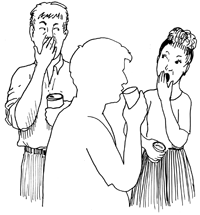STRANGE BUT TRUE- Not bored: Likely mates yawn in synch

DRAWING BY DEBORAH DERR McCLINTOCK
Q. Yawns are well known to be contagious but won't spread to just anyone. So how might you use one of your own (real or counterfeit) to work as matchmaker for you? –R. V. Winkle
A. At a party among strangers, yawn and see who yawns with you, says Charlottesville resident Jennifer Ackerman in Sex, Sleep, Eat, Drink, Dream: A Day in the Life of Your Body. Only about 40 percent of the population are given to this sort of interpersonal rapport, the folks who tend to score high on self-awareness and empathy. So it's the empathic ones among us who are most susceptible, meaning if you're seeking a romantic partner on your same wavelength, yawn and see who yawns back. This will help you identify not only those who may have been surreptiously watching you but also those you'd most hope to be doing so, while weeding out the unpromising starers.
Q. Athletes spit incessantly, dental patients spit on command, petulant protesters spit to make a statement, lovers may exchange saliva in the heat of things. Aside from envelope licking, what's saliva pragmatically good for? –D. Xiaoping
A. As a watery substance, it helps lubricate our wagging tongues, inhibits the growth of bacteria and aids digestion, says David T. Wong in American Scientist magazine. Yet the biomedical community has been slow to recognize the telltale nature of saliva regarding the body. Like blood, it contains many genetically encoded proteins and RNA molecules. Several abnormal conditions can be pinpointed in expectorant, which is easier and cheaper to collect than blood and doesn't expose health-care workers to blood-borne diseases.
"Saliva is the mirror of the body" is the aphorism among dentists, reflecting the levels of natural and artificial substances such as therapeutic or recreational drugs. It can also indicate emotional and hormonal status, the health of the immune system, neurological conditions, nutritional deficits. As biomarkers become more prevalent and sensitive, "salivary diagnostics" may become more and more just what the doctor (and medical economics) ordered.
Q. What's the psychology behind thinking "the grass is always greener on the other side of the fence"? –D. Scott
A. Forget any mind games here. Your neighbor's grass will often literally look greener because of your oblique viewing angle compared to viewing your own lawn underfoot, says Jearl Walker in The Flying Circus of Physics. When you look straight down, you'll see a hint of dark soil that somewhat "de-greens" your own patch of grass. (Of course, parched conditions or recent checkered grass blade mowing patterns are other common de-greeners.)
Q. What's the most common typo in the English language? –R. Hingeley
A. Is "DNA" a typo for "and" or "and" for "DNA"? Actually, "and" is more commonly typoed as "amd." You can see the complexities here. Also, some words that look wrong are in fact correct in another language ("trafic" in French) or they are unfamiliar proper names.
As a gauge here, try typing some deliberate typos into a popular search engine, suggests New Scientist magazine reader and training consultant Graham B. He once miskeyed in "traiing" and a major search engine tallied 52,700 web pages containing the word. "Rigth," the next word he tried, appeared 733,000 times. Yet even this one proved a minnow alongside "becuase," which turned up 4,950,000 times! So if you've got the staimna– stanima– stamna... for it, check out the "Typo of the Day for Librarians" site and get your chosen search engine going.
Send Strange questions to brothers Bill and Rich at [email protected].
#